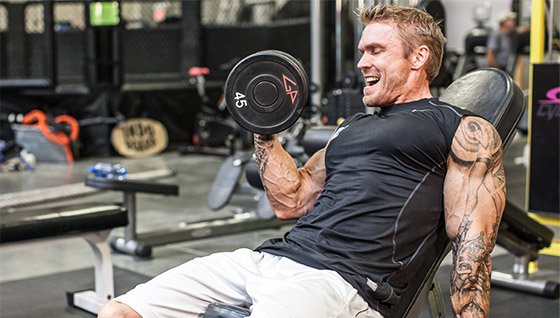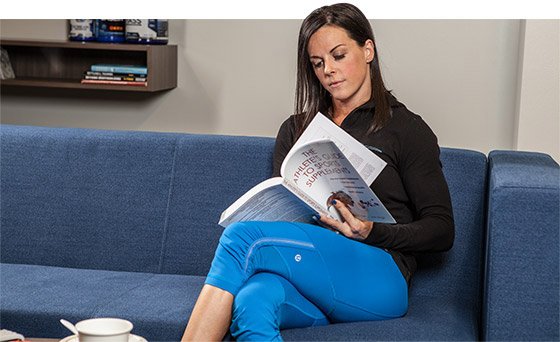For many people, rock-hard six-packs and stunning V-tapers exist only in their wildest fantasies. They think that the ultra-fit models on the covers of magazines are one in a gazillion, and there's no way a normal person with a full-time job and crazy responsibilities outside the gym could ever hope to look like that.
This attitude, while pervasive, is B.S.
Have you ever been to a fitness expo or physique competition like the Arnold Sports Festival? Have you ever noticed something about the people who gather there? The vast majority of them are fit! In an exposition full of lean, muscular people, the doubters who think fitness is only for the elite few may change their tune.
If so many other people can do it, why can't I?
It's true that most super-fit people have dedicated at least a part of their lives to the pursuit of health and fitness. Fitness takes time, it takes dedication, and it takes a hell of a lot of hard work. But you know what? No matter your story, your background, or your lifestyle, you have the ability to change for the better.
If you're ready to go from covering up your body to being the cover model of your own life story, follow these simple rules:
Push Your Limits To The Limit
James Grage, the co-founder and vice president of BPI Sports, explains that the most essential aspect of changing your body is to train past your comfort zone.
"Most people want to quit when their muscles start to burn or shake with fatigue. Instead of viewing this as the 'downside' of training, reframe your mind and tell yourself that this pain is exactly what you're chasing. You want the burn; you want the discomfort. That's what will enact change in your body."

Training hard and with intensity doesn't have to mean spending hours in the gym. Whitney Reid, fitness model and BPI Sport's East Coast Sales Manager, says that pushing it in the gym means you're making your workouts count.
"How many people do you see in the gym spending half of their workout on the phone? Get in the gym, put the phone down, and train hard for 40 minutes. You should be completely exhausted when you're done."
Just going to the gym isn't enough. Don't cheat yourself by being mentally lazy.
Follow The 90/10 Nutrition Rule
Your nutrition plan is almost more important than your training program, so it needs to be the priority in your healthy lifestyle. However, nutrition doesn't have to be a huge burden.

"The biggest stumbling block with nutrition is typically a lack of planning and scheduling. When you're unprepared and hungry, you'll eat whatever is convenient. Plan your meals in advance," says James.
If you don't have the time or inclination to prepare all of your meals for the next week, that's OK, but you should plan for your schedule. Cook extra dinner and bring Tupperware to work or look at online menus so you know what to order if you go out for a business lunch.
"Setting an extremely strict meal plan and training schedule is great if you don't have a life," says Whitney. "But I travel 10 days or more every month for work so I have to be very flexible with my training and my nutrition. I don't like traveling with 20 Tupperware containers, and I don't really have time to worry about that, so I like to find decent places to eat."
Restaurants will be able to adjust their recipes to fit your nutrition needs. Request your chicken breast without sauce or your vegetables steamed without butter.
"You have to be able to make adjustments," says James. "If I'm going out to dinner at night, I'm typically a little stricter earlier in the day. If I'm eating clean and healthy 90 percent of the time, then the other 10 percent I don't have to be perfect. "
Sound Recovery Takes A Little Work
Training should be an important part of your life, but you won't see results if you don't allow your body to rest. It's easy to get excited about your program and want to train 24/7, especially if you're seeing awesome changes. But don't forget that your muscles can't grow unless they're able to recover.
Schedule your training regimen to include at least one rest day. Along with allowing your muscles to recover, rest days can be crucial to your mental health and your relationships with other people.
Enjoy your days away from the gym. Concentrate on other things that make you happy so you can maintain balance in your life.
Remember, this is no "health kick." You're changing your lifestyle entirely so you can stay fit for the long haul, not just for a few months.
A lifestyle change means you need to have a plan that you know you can stick with. Rest days are an important part of that plan.
Supplements Matter
Supplements are an important part of a fitness regimen. They're like the icing on the proverbial cake. If every other aspect of your cake is great, the icing will set it apart.
"I like supplements for multiple reasons," says James. "If I'm eating right, supplements keep me accountable to my training plan. It's a simple thing you can do each day to 'initiate' the sequence on your daily fitness process." By making supplementation a part of your nutrition plan, you'll be more likely to stick to both aspects of your fitness regimen.
"The other reason I like supplements is the way they make me feel," James says. "When I take a capsule of fat burner in the morning, it primes my system for burning fat, but it also gives me great energy. I'm able to go in and train at my peak level. I really enjoy that extra focus and energy that I get." You can't expect your supplements to make changes for you—they just won't. They can bring out the best in your training and nutrition so you can uncover your best body.
Personalize Your Motivation
Wanting a better body can only get you so far. The "want" has to be bolstered by a meaningful, specific goal. "Once you have an image in your mind of what you want to achieve, then you need to test the strength of that goal by exploring its meaning," says James.
"If your goal doesn't have enough personal meaning, then it's never going to give you the long-term motivation you need to create change."

If you want a better body, it's important to analyze why. Is it for your growing gut? Is it so you look better naked? Is it to live a longer, richer, healthier life? The reason for your goal should come from beyond the superficial. That way, it's strong enough for you to use for consistent motivation.
"Remember," says James, "a great physique isn't built overnight. It requires consistency and diligence. I always remind people that there's a difference between enthusiasm and motivation. Enthusiasm may come easier, but it's fleeting. Enthusiasm is going to leave you hanging after a few weeks. Motivation will have your back for the long haul."
